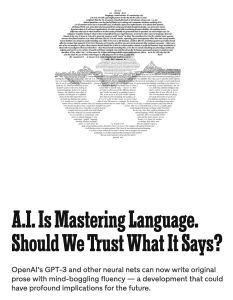
A.I. Is Mastering Language. Should We Trust What It Says?
OpenAI’s GPT-3 and other neural nets can now write original prose with mind-boggling fluency – a development that could have profound implications for the future.
Read or listen offline
Recommendation
What would the world look like with real artificial general intelligence (AGI)? With OpenAI’s remarkable new large language model (LLM) GPT-3, you can see glimmers of the future to come. GPT-3 uses sophisticated neural nets to facilitate word prediction, generating unique compositions based on 700 gigabytes of curated data. This technology would have broad applications across sectors. The troubling question is: Should humanity create such an entity, and what are the possible unintended consequences? OpenAI’s founders want AGI to “benefit” all humanity – but it’s not clear if that is possible, or even desirable.
Take-Aways
About the Author
Steven Johnson is a contributing writer for The New York Times Magazine and the author of Future Perfect: The Case for Progress in a Networked Age. He also writes the newsletter Adjacent Possible on Substack.


























Comment on this summary or Diskussion beginnen